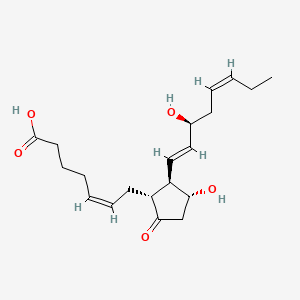| Neuman JC et al. |
Enriching Islet Phospholipids With Eicosapentaenoic Acid Reduces Prostaglandin E2 Signaling and Enhances Diabetic β-Cell Function. |
2017 |
Diabetes |
pmid:28193789
|
| Ma J et al. |
[Effect of polyunsaturated fatty acids ω-3 and ω-6 on angiogenesis formation in human gastric cancer]. |
2017 |
Zhonghua Wei Chang Wai Ke Za Zhi |
pmid:28105626
|
| Araki Y et al. |
PGE1 and E3 show lower efficacies than E2 to β-catenin-mediated activity as biased ligands of EP4 prostanoid receptors. |
2017 |
FEBS Lett. |
pmid:28986997
|
| Gose T et al. |
Prostaglandin transporter (OATP2A1/SLCO2A1) contributes to local disposition of eicosapentaenoic acid-derived PGE3. |
2016 |
Prostaglandins Other Lipid Mediat. |
pmid:26692285
|
| Holen E et al. |
Combining eicosapentaenoic acid, decosahexaenoic acid and arachidonic acid, using a fully crossed design, affect gene expression and eicosanoid secretion in salmon head kidney cells in vitro. |
2015 |
Fish Shellfish Immunol. |
pmid:26003739
|
| Upadhaya SD et al. |
Vitamin E and omega-3 fatty acids independently attenuate plasma concentrations of proinflammatory cytokines and prostaglandin E3 in Escherichia coli lipopolysaccharide-challenged growing-finishing pigs. |
2015 |
J. Anim. Sci. |
pmid:26115279
|
| Djuric Z et al. |
Effects of a Mediterranean Diet Intervention on Anti- and Pro-Inflammatory Eicosanoids, Epithelial Proliferation, and Nuclear Morphology in Biopsies of Normal Colon Tissue. |
2015 |
Nutr Cancer |
pmid:25869112
|
| Yang P et al. |
Prostaglandin E3 metabolism and cancer. |
2014 |
Cancer Lett. |
pmid:24657656
|
| Tanaka N et al. |
Transport of eicosapentaenoic acid-derived PGE₃, PGF(3α), and TXB₃ by ABCC4. |
2014 |
PLoS ONE |
pmid:25275481
|
| Pilkington SM et al. |
Impact of EPA ingestion on COX- and LOX-mediated eicosanoid synthesis in skin with and without a pro-inflammatory UVR challenge--report of a randomised controlled study in humans. |
2014 |
Mol Nutr Food Res |
pmid:24311515
|
